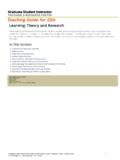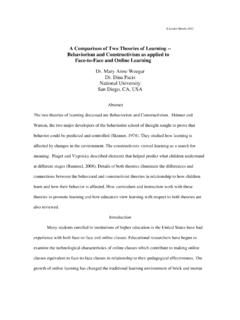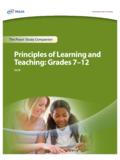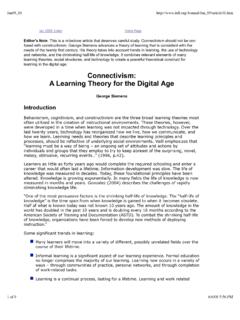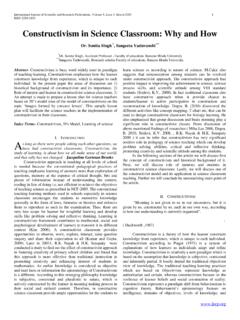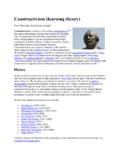Transcription of A Brief Study on the Implication of Constructivism ...
1 International Education Studies Vol. 3, No. 2; May 2010 197A Brief Study on the Implication of Constructivism Teaching Theory on Classroom Teaching Reform in Basic Education Qiong Jia Normal College, Shihezi University, Shihezi 832003, China E-mail: Abstract Constructivism learning theory is the further development as behaviorism arrives at cognitivism. According to its teaching theory: knowledge is uncertain; the learning process of knowledge is also the construction process of knowledge; students are the main body of learning activity and they construct knowledge on their own initiatives; teachers are the helpers and the drivers for students constructing knowledge. These views generate more implications for China s teaching reform, what affect the reform of learning theory and teaching theory in a sense and turn into the theoretical base for China s education reform.
2 This paper tries to probe into the Implication of Constructivism teaching theory on China s basic education. Keywords: Constructivism , Learning theory, Basic education, Implication Constructivism , as a new cognitive theory, has been introduced in China since late 80s and early 90s in 20th century, exerting a significant effect on the education field. The development from behaviorism to cognitivism to Constructivism is not only a leap of epistemology and a progress of learning psychology, and also a revolution of traditional education. Constructivism s profound and unique recognition to human learning make the traditional teaching thought change thoroughly, generating a deep effect on teaching practice. In recent years, Chinese scholars introduce the Constructivism theory sufficiently and make systematic studies, producing amounts of rich research fruits.
3 The author thinks that the Constructivism teaching theory has an important guiding effect on China s basic education reform. This paper tends to probe into the Implication of Constructivism teaching theory on China s basic education and teaching. 1. The origin of Constructivism Any theory has its basis and background. Constructivism learning theory is not an exception. Its origins mainly include philosophy and psychology. The philosophy origin Constructivism , as a new thought, is a new learning philosophy. Some people agree that the first constructivist is Socrates. His hippcrates is a successful model for Constructivism teaching. Kant s studies on the integration of rationalism and empiricism indicate kind of Constructivism . In his opinion, the subject can not open toward the external world directly. Only by the constructed-internally principal cognitive rules, the subject can organize experiences and develop knowledge.
4 Later, along with the transfer of structuralism methodology toward post-structuralism, the absolute status of rationalism is broken further. Constructivism learning theory comes into being from the development of cognitivism, turning into a new learning theory. The psychology origin In perspective of psychology, the first who contribute a lot to the development of Constructivism thought and apply it to classes and students learning and development are Dewey, Piaget, and Vygotsky. Dewey advances the experimental learning theory, emphasizing on the generation and reform of experiences. Switzerland Famous psychologist Piaget is taken as the forerunner of modern Constructivism . In 1972 Piaget puts forward the concepts of assimilation and conformability . In his opinion, the recognition means the subject affects the object by his unique recognition structure, achieving a balance between the subject and the object.
5 Based on psychological ideas, Piaget thinks that all knowledge has the external origin and students cognitive development is actualized naturally in the process of receiving knowledge. During 70s and 80s in 20th century, Russia excellent psychologist Vygotsky founds the base for the formation of modern Constructivism . According to his idea, learning is a social construction. Individual learning is under certain history and social background. 2. Basic ideas of Constructivism learning theory On knowledge Knowledge is only an explanation and an assumption but not the final answer for all questions. In contrast, it will be discarded along with the human process and new assumption will appear. Besides, knowledge can not International Education Studies 198summarize the world rules precisely.
6 In other words, we can not apply knowledge to certain problems directly. We have to analyze certain issue based on practical conditions. In addition, constructivists agree that knowledge can not live on its physical form and out of specific entity. Although language and signals endow knowledge with certain forms, it does not mean learners have same understandings toward these statements, just as one hundred people will have one hundred different understandings toward Hamlet. These understandings are based on individual learners experiences and backgrounds, what is determined by specific learning experience. On learning Learning is the process that individuals construct their cognitive structures. Construction is a kind of initiative, conscious, and self-organized recognition way.
7 It is the interaction between the subject and the object. The learning process is the construction of knowledge. Learning is an initiative construction and the generation of meanings. This process is completed by the interaction of learners old and new knowledge. In other words, pure external stimulation is meaningless. Only when learners code, process, and construct their unique understandings based on their previous experiences, can it be real learning. On students Students enter classrooms with their rich previous experiences. They hold their opinions toward daily life and even universal issues. Even though they do not know some issues and have no experiences, they may form special explanations and assumptions based on previous experiences and cognitive abilities as some issues appear.
8 That is not illogical guess but logical assumption based on previous experiences. Therefore, teaching should take students previous knowledge and experience as the growth point of new knowledge, and introduce students to generate new knowledge from the former. On teachers As we emphasize on the students as the subjects, we should change the role of teachers, from the initiator and the indoctrinator into the helper and the driver for students constructing meanings initiatively. In other words, teachers should be the designer of teaching environment, the guider for students learning, and the academic consultant for students. It discards the traditional teaching mode that takes teachers as the center, which merely focuses on conveying knowledge, regarding students as the object for receiving knowledge.
9 The new teaching mode takes students as the center, under the guidance of teachers. Teachers organize and guide the whole teaching process. 3. Implication of Constructivism theory on classroom teaching in basic education Based on analysis above, we know that Constructivism learning theory puts forward new explanations for learning and teaching. According to this theory, students are the subject in teaching. Teachers should offer more humanism cares for students and create a favorable teaching environment for students. It emphasizes on the initiatives and the interaction in teaching. Students should focus on exploration learning and cooperative learning based on previous knowledge and experiences by means of interactive actions. By this way, students can improve their cognitive ability continuously.
10 Teachers can help students form the positive technique, the affection, the attitude, and the habit in learning. All these innovative ideas constitute the complete Constructivism teaching theory system, which contribute a lot to modern teaching theory. Constructivism teaching theory has important meanings for China s basic education that focuses on improving students comprehensive quality. (1) Reform the teaching views. Pro. Lan Ye has said: Today s teaching reform should change not only the teaching theory but also the teachers teaching views, together with teachers daily teaching activities. In the traditional teaching mode, teachers explain, analyze, and introduce too much. Students receive knowledge passively. They have few time and space for thinking.










